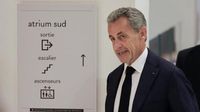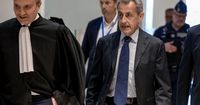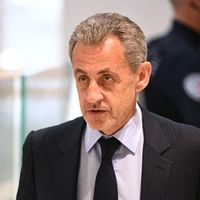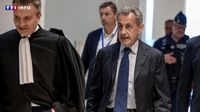In a dramatic turn of events, former French President Nicolas Sarkozy finds himself facing severe legal consequences as the prosecution has requested a staggering seven years in prison, a €300,000 fine, and a five-year ban on holding public office. This demand comes as part of the ongoing trial concerning allegations of illicit financing of his 2007 presidential campaign, linked to the regime of Libyan dictator Muammar Gaddafi.
The prosecution's case, presented on March 27, 2025, follows a comprehensive twelve-week hearing where prosecutors painted a grim picture of Sarkozy's political ambitions, accusing him of engaging in a "frantic quest for financing" to support what they termed a "devouring political ambition." Prosecutor Sébastien de la Touanne asserted that only a firm prison sentence and fine could adequately protect society and strip Sarkozy of certain civic rights.
Sarkozy, 70, has been adamant in his defense, vehemently contesting the accusations against him. He has previously stated, "I will demonstrate my innocence, it will take as long as it takes, but we will get there." He has consistently denied any wrongdoing, questioning the absence of concrete evidence to support the claims against him. "Where is this money?" he challenged, insisting that the allegations are built on mere hypotheses.
The case against Sarkozy is rooted in a purported "corruption pact" allegedly struck in 2005 when he was Minister of the Interior. The prosecution claims this agreement was made to secure financial backing for his presidential campaign in 2007. According to a note published by Mediapart in 2012, Libyan secret services suggested that the Gaddafi regime had funneled €50 million into Sarkozy's campaign. This claim was bolstered by statements from Ziad Takkiedine, a controversial businessman, who asserted he delivered three suitcases of cash to Sarkozy's ministry.
During the trial, evidence was presented showing a €500,000 transfer from abroad to the bank account of Claude Guéant, Sarkozy's former chief of staff. Guéant, along with other former ministers, is facing serious repercussions, with the prosecution seeking six years in prison and a €100,000 fine against him, three years and a €150,000 fine against Brice Hortefeux, and one year in prison with a possible suspension and a €3,750 fine against Éric Woerth.
The prosecution characterized the alleged pact with Gaddafi as "inconceivable, unheard of, and indecent," reflecting the gravity of the accusations. They asserted that Sarkozy was not merely a participant but the "true mastermind" behind the arrangement, which purportedly aimed to secure financial support in exchange for political favors.
Sarkozy's legal troubles are compounded by his previous convictions. In December 2024, he was sentenced to one year in prison in the "Bismuth" affair, which involved corruption and embezzlement of public funds. In February 2024, he received another one-year sentence, including six months of actual imprisonment, linked to the Bygmalion affair regarding the financing of his 2012 campaign. Currently, he is under electronic surveillance due to these convictions.
As the trial continues, Sarkozy's defense team is preparing to present its arguments on April 8, 2025. They maintain that the prosecution's case lacks substantive evidence, with lawyer Jean-Michel Darrois arguing that no proof of illegal financing has been found. He described the prosecution's demands as excessively harsh, suggesting they are an attempt to compensate for the weaknesses in their argument.
In addition to Sarkozy and his close associates, the trial also involves several other figures, including Thierry Gaubert and Alexandre Djouhri, both of whom are facing serious charges related to the alleged corruption scheme. The prosecution has called for significant penalties for these individuals as well, emphasizing the need for accountability in what they describe as a serious breach of public trust.
Throughout the proceedings, Sarkozy has expressed indignation at the accusations, claiming that they are politically motivated and designed to undermine his reputation. He has characterized the prosecution's actions as an attempt to mask the weakness of their case. "The falseness and violence of the accusations and the excessiveness of the requested penalties aim only to conceal the weakness of the alleged charges," he stated on social media.
The unfolding legal saga has captivated public attention in France, with many closely following the developments of this high-profile case. The outcome could have significant implications for Sarkozy's political future and legacy, as well as for the broader landscape of French politics.
As the court prepares to hear the defense's arguments, the stakes remain high for Sarkozy and his co-defendants. The prosecution's requests for severe penalties reflect not only the seriousness of the charges but also the broader concerns about corruption and accountability in political financing.
In a country where political scandals have repeatedly shaken public trust, this trial serves as a critical test of the legal system's ability to address allegations of corruption at the highest levels of government. The coming weeks will be crucial in determining whether Sarkozy can successfully mount a defense against these serious accusations or if he will face the severe penalties sought by the prosecution.








